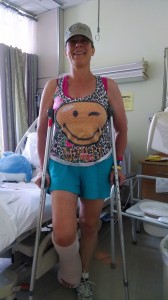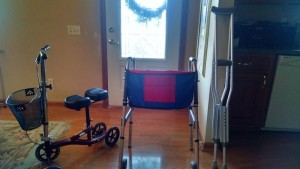 I truly have been blessed in my life. I’ve never had a hospital stay, except for the birth of our three kids. I’ve been very healthy, leading an active lifestyle with no problems in sight. I’ve loved to exercise (especially running) since I was eighteen, ramping it up at the age of 40 to regularly train and enter sprint triathlons.
I truly have been blessed in my life. I’ve never had a hospital stay, except for the birth of our three kids. I’ve been very healthy, leading an active lifestyle with no problems in sight. I’ve loved to exercise (especially running) since I was eighteen, ramping it up at the age of 40 to regularly train and enter sprint triathlons.
However, I really had no business running countless miles with very flat feet. I finally had to pay the price with surgery, limping for the rest of my life from a ruptured tendon was not an option to me. The surgery requires me to be in a soft cast for 2 weeks, hardcast for 4 weeks then a soft boot for another 4 weeks. That makes a total of 10 weeks I can’t drive.
I’m writing this to share what I’ve experienced so far, in hopes that if any of you go through surgery that leaves you immobilized for a while, you’ll have a better idea of what to expect, both physically and emotionally:
1. Equipment Needed- I’ve tried all of these items:
The crutches are somewhat helpful and give you the most mobility, however, I also think they are the most difficult to maneuver, so I really don’t see their benefit for me. The walker is great for going short distances outside on grassy, uneven or rocky terrain but it requires a lot of muscles and legwork for the long-term. The lifesaver for me is the “scooter.” You can easily get around the house on one level. Just be ready to get the nickname “Scooter.” That is the new nickname everyone in my family has given me, but I can live with it. Whoever invented the ‘ortho-trike’ deserves a lifetime achievement award for it allows you to function (almost) normally. I really recommend that you rent what you think you need before surgery (which by the way, I almost didn’t do) so you can use them immediately after surgery.
2. Don’t Expect to Accomplish All of Your Life’s Goals in Recovery- Please don’t laugh when I tell you this but I really put a lot a pressure on myself at the very beginning of my recovery to accomplish ALL my life’s goals in this period. I said to myself, “Heh, I’m homebound for 10 weeks, I better get something accomplished with all of that free time!” You will quickly find out that it takes a lot more effort to do just the simple things in life like taking the dogs out, making a meal or even just getting dressed. By you piling onto that with an uptight mode because you are not accomplishing all of your goals will only frustrate you, bring you down AND impede your recovery. So say to yourself or loved one what I said to myself when my psyche was uptight and out-of-control: “CHILL OUT!”
3. It’s Okay to Get a Little Help- If you are someone that has a hard time asking for help, as I am, it’s time to change that thought process also. At first I didn’t want any help right after surgery, knowing that I would be totally alone (except for the dogs) as soon as we came home. Randy works incredibly long hours anyway, but he additionally was just asked to assume a leadership role at the hospital a few day before, so his workload increased exponentially. It was a smart move on my part to ask my in-laws Pat and Bob Tobler to help for a few days until I could function somewhat normally. Those were tough days, but their help made it so much easier! I also am thankful for neighbors like our Bible Grove neighbor Alisa Kigar who brought dinner and a breakfast too. I have just put that nice gesture in my memory banks so I’ll be sure to help others when they need a little helping hand.
4. Expect to be Humbled- Getting dressed is a challenge, as is taking a daily sponge bath (you can take a shower BUT if you get the cast wet, you have to be recast-not an option for me), fixing a meal and the list goes on. Just expect to be humbled from the start. The toughest challenge for me, though, was when I wanted to start getting the mail. Our post office box is a little walk to the road, roughly 75 yards:
However, this walk seemed like MILES to me on crutches. I like to think I am pretty fit, but I can’t tell you how many times I stopped for a breather to get to the mailbox in front of our house! I now use a walker, which to me has more stability, however, it still is a true aerobic workout. I also get down the steps, bum first, then use the walker to get around downstairs. I know I’ll be a pro at this in the coming weeks!
5. Take Care of Yourself- In The Perfect Day in the of the Game of Life, I outline the “whats” of a healthy, balanced life. However, in the recovery phase, you need to ramp up that care of yourself, both physically and emotionally, for a speedy recovery. In Mood and Attitude Critical to Patients Recovery, it was surmised that orthopedic patients recover much quicker if they have a positive attitude throughout the recovery period. Here is a little different twist on the healthy balanced lifestyle, specifically for surgical recovery:
a. Nutrition- Do not expect yourself to fix those great meals you slaved over before you had surgery. Give yourself a break. However, very simple meals can be nutritious too, i.e. pan seared salmon on a bed of quinoa with a tomato basil salad. Just make sure to tell your loved one of any required ingredients that need to be purchased, the day before, so you can accomplish these meals. Hey, I just realized my definition of ‘simple meal’ has changed since having the privilege of cooking with some pros in the last couple years! ‘Kaching!’ for a bruised ego!
b. Movement- You know I LOVE to exercise, so I was not going to let a dysfunctional leg get in the way of experiencing my daily “fix” of exercise. Understand, one of the reasons I am so hooked on exercise is not because I’m worried about the numbers on the scale. No, it is strictly the great feeling I get from pushing myself physically. Here are a few tapes I can recommend for you:
This Cindy Crawford- The Next Challenge tape has been my go-to for at least the last 10 years. To modify this exercise, I put my leg on one chair and fast forwarded the tape through the aerobic section. I watch the tape while it is fast forwarding and mimic the arm and leg movements as much as I can to get my heart rate in the aerobic zone. Then I follow the rest of the tape with simple modifications, weights in my hands. The Windsor Pilates and Ab-Ripper X are also great tapes because they can be modified enough that you can get a good workout in without injury.
c. Mental Push-ups- When I said to take it easy, I meant it. However, that does not mean you can’t challenge your mind in a fun way during recovery. I don’t think spending the day watching television or looking at Facebook is a positive way to spend your entire day. I recommend expanding your mind a little, but not so much you can’t relax. These are the examples I’m talking about: reading a favorite book you’ve put off, talking to a friend, playing with a recipe that’s not too difficult but it offers you a creative challenge, researching a subject that you’ve always been fascinated with (but didn’t have the time to pursue) or learn a new language. The last one is what I’m embarking on. In Spain Off The Beaten Path: An Unexpected Spectrum of Life’s Richest Treasures, I introduced you to a talented Spanish chef that is also my friend, Chef Fatima Perez Andres . We had a mutual goal in common, she wanted to learn English as much as I wanted to learn Spanish. We use a translator and assistance from different language programs to converse on Skype almost everyday:
I won’t lie, it is sometimes very frustrating but we are now just starting to catch a few words from each other that we both understand! Seeing glimpses of progress is a great mental booster!
d. Spiritual Welfare- I personally believe that Christ Jesus is my savior, so to me, connecting with that necessary spiritual side of me was even more imperative in recovery. I do study guides by Beth Moore in tandem with Bible readings. Taking the focus off of myself and getting the “Big Picture” is what this has done for me. Having quiet moments of meditation and relaxation have also been very helpful.
Surgical Recovery Recap:
1. Renting mobilizing equipment before surgery will assist you in leading a more normal recovery phase.
2. Don’t expect to accomplish all of your life’s goals in recovery.
3. It’s okay to get a little help.
4. Expect to be humbled.
5. Take care of yourself.
Finally: Embrace surgical recovery as a refreshing “Everyday Life” pause button! That will put you in that positive mindset so critical for a speedy recovery!








Great blog, Heliene!
Really good suggestions for people to think about when recovering from any type of surgery. Very helpful tips. Glad to see you are finally in the cast & it won’t be long till the boot goes on & you will be able to walk easier.